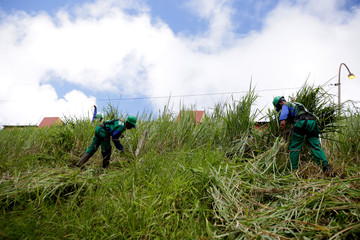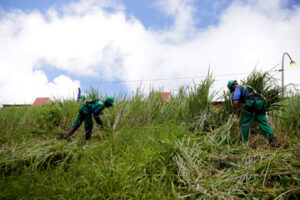When you work with a reputable excavation contractor, they prioritize precision, safety, compliance, and cost-efficiency. This sets the stage for a smooth construction journey.

An experienced excavation contractor will know how to handle unforeseen challenges, such as contaminated soil or complex stormwater problems. Their services also include digging trenches for vital infrastructure like sewage, water, and electrical lines. Keep reading the article below to learn more about Excavating Contractor.
Trenching involves digging narrow excavations to install utility lines, drainage systems or construction foundations. It requires extreme precision to ensure that walls do not collapse. The work can be dangerous, and many factors affect trench stability. Inadvertently striking buried water, gas or electricity lines can cause catastrophic accidents and expensive damage. An excavating contractor will take care to locate and mark all buried services, call before digging, and verify the accuracy of any information received from utilities or owners. They will also assess soil conditions to determine whether the trench is stable and may require additional support or protection systems.
The right equipment and experience are key to minimizing risks, keeping costs down, and completing projects on time. An experienced excavation contractor will provide the appropriate specialized machinery, as well as trained operators to safely operate it. In addition, they will build roads or other access structures to enable other construction crews to efficiently and safely use the site.
An excavation contractor will have experience with both residential and commercial projects, including building roads and parking lots as well as installing storm sewers and septic systems. They will also have a thorough understanding of local regulations and requirements. This can help reduce permitting delays and minimize the impact of construction on local residents and businesses.
Land clearing may be required for a variety of reasons, from improving the appearance of a property to reducing fire hazards and improving safety. An excavation contractor will be able to identify and clear away trees, brush, stumps, debris and other obstructions, as well as level and grade the terrain.
An important part of trenching is preventing cave-ins, which can be extremely dangerous for workers. They can be prevented by sloping, benching, or shoring the trenches and using engineering protective systems. They can also be prevented by regularly inspecting the trenches, their adjacent areas, and protective systems at the beginning of each shift, before workers enter them, and after any event that could change the stability of the trench. They can also be prevented by ensuring that there is always someone stationed above ground to warn workers of danger and provide emergency assistance.
Leveling
Most construction projects involving buildings, roads and other structures require some sort of excavation. Excavation contractors are a vital part of the construction process, and their job is much more than simply picking up dirt and moving it around. In fact, professional excavation is a complex task that requires considerable technical knowledge and expertise.
An important service that excavating contractors provide is site grading and terrain leveling. This ensures that the foundation of any building or other structure is laid on a stable and solid surface, which helps to prevent basement floods, structural damage and other problems. Depending on the scope of the project, this may also include installing various features like drainage ditches or clearing space for utilities.
Once the crew has determined the precise measurements of the foundation, they will prepare the ground by digging to a specific depth. An excavator is usually put to work at this point and the soil is tested to make sure it can handle the weight of the new structure. In many cases, the excavator must also dig down to the correct depth for underground utility lines as well.
Before any dirt is moved, an excavating contractor will closely review a project’s specifications and survey the future jobsite to develop an appropriate plan. This often involves detailed discussions about potential challenges like soil consistency and the presence of underground utilities.
As the work progresses, an excavating contractor will use tools and machinery like backhoes, bulldozers and trenchers to remove rock and soil as needed. They will then grade the remaining land and compact the soil as necessary. Depending on the scope of a project, this could include anything from rerouting sewer pipes to digging drainage ditches or clearing space for utilities.
An excavation contractor may also install specialty soils on a construction site, which are engineered to achieve particular construction goals. This could be a material like engineered fill or a special type of soil blend that is intended to improve the load-bearing capacity, drainage or stability of the ground. They may also implement systems that manage stormwater runoff to prevent erosion, habitat loss and other environmental concerns.
Integrating Vital Infrastructure
A successful excavation project requires more than just digging holes and moving dirt. It involves integrating crucial infrastructure, and careful handling of underground utilities like water, sewage, and electric lines. Professional contractors use advanced planning and expertise to anticipate problems like these before they arise, preventing costly delays and ensuring structural stability in the final product.
Taking on such a complex task is incredibly difficult for amateurs, which is why hiring a licensed contractor is the best way to guarantee a safe and effective building site. A reputable contractor will ensure that all necessary permits are in place before commencing work, and will follow strict safety standards to prevent accidents during the process. They will also handle the necessary clean-up afterward to avoid property damage and environmental contamination.
In addition to laying underground utilities, excavating contractors will also install essential services such as sewage and water systems. This often involves trenching—digging narrow excavations to lay utilities—and ensuring that these lines are accurately placed while avoiding disruption of existing services. It takes a lot of knowledge and experience to do this correctly, while also ensuring that the surrounding ecosystem is protected.
Building roads is another area where excavating contractors are indispensable. They manage the earthmoving needed to create a stable base, and then integrate utility, drainage, and concrete structures into the road, ensuring that it is ready for paving by the end of construction. In the case of residential or commercial construction, they will also perform landscaping to finish off the finished look.
Erosion control is a vital part of any construction project, and excavation is no exception. This includes managing soil erosion before it can cause problems, and implementing stipulations that prevent pollutants from getting into the water supply or damaging the buildings being constructed.
The industry of excavating contractors is constantly growing and evolving to meet the demands of a changing economy. It is a highly competitive field, with companies leveraging different factors to set themselves apart. Economic conditions, advances in construction technologies, and collaboration with other construction professionals are key factors driving the ongoing growth of this sector.
Preparing the Site
There is a lot that goes into preparing a construction site for excavation work. This includes identifying and marking underground utilities, which are critical to avoid accidental damage during the excavation process and avoiding costly repairs down the road. It also involves clearing the land of existing structures and vegetation, hauling away debris, and constructing access routes for crews and equipment to maneuver around the site.
The geological composition of the site also plays an important role in determining its feasibility for excavation. A qualified geotechnical engineer can perform a detailed analysis to determine the ground’s strength and stability, enabling an excavation contractor to design an appropriate foundation for the project.
When laying essential infrastructure like sewage, water lines and electricity, an excavation contractor must be detail-oriented to avoid interfering with existing services. This requires trenching to create narrow holes for the lines, which must be placed accurately to ensure maximum functionality of the finished project. It also requires coordinating with paving teams to manage drainage, another key factor in project longevity.
Some projects require more extensive land alteration and grading services. An excavating contractor can use specialized tools to change the shape of the site, flatten undesirable inclines and construct exciting terrain features, or compact the soil for increased durability. They can even optimize water drainage to prevent erosion and flood control issues.
In addition to these essential excavation preparation services, a competent and experienced construction site prep contractor can help a project stay on schedule and within budget by providing crucial support services. These include ensuring that the proper heavy-duty machinery is used for the job, obtaining necessary permits and approvals, and taking precautionary measures to protect personnel and equipment during construction. They can also arrange temporary roads and parking facilities, provide security fencing and barriers, and install signage to direct traffic throughout the site. These logistical services make all the difference in ensuring that excavation work is performed on time and to specifications. They can also reduce the risk of accidents, injuries, and other disruptions to construction timelines by removing all impediments to excavation work.


